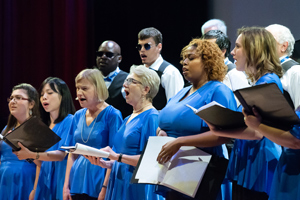 Students of the Filomen M. D'Agostino Greenberg Music
Students of the Filomen M. D'Agostino Greenberg Music
School performing at their 21st annual concert at
New York's Metropolitan Museum of Art.
Through Elliot, I got to know the FMDG Music School. Since it opened in 1913, FMDG has been a vital resource for students of all ages and levels throughout the city and surrounding area as well as a training ground for music teachers. The school offers lessons and classes in voice, piano, guitar, recorder, flute, clarinet, saxophone, trumpet, drums, percussion, braille music and accessible music technology for students of all levels, from beginner to advanced.
Students can participate in vocal, Latin jazz and contemporary pop/rock ensembles as well as a rock band workshop. FMDG students, many of whom are quite accomplished, give performances around the city (I’ve been to one, and it was excellent), most notably an annual holiday show at the Metropolitan Museum of Art.
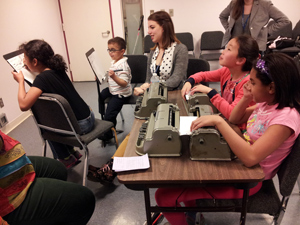 | 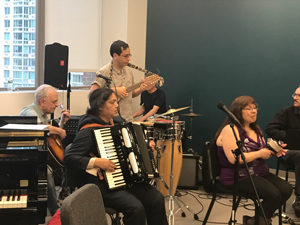 |
| Students learning rhythmic dictation. | Members of the school’s Latin band in rehearsal. |
Past FMDG students have included pop music great Jose Feliciano. More recently, Matthew Whitaker, a critically acclaimed 17-year-old pianist, organist, drummer, composer and arranger, has been studying there. Whitaker has thrilled audiences at the Newport Jazz Festival, Carnegie Hall and the John F. Kennedy Center for the Performing Arts in Washington, DC, and tours internationally.
In late 2018, FMDG suffered a major setback when the Lighthouse Guild—which formed a few years ago when Lighthouse International merged with the Jewish Guild Healthcare—ended its financial support, which resulted in the school having to vacate its midtown Manhattan facilities. Since then, the school has been operating on an ad hoc basis, holding classes at the 92nd St. Y and other welcoming venues around town while searching for a new home and a steady revenue stream.
Looking ahead, the school has incorporated in New York State and filed for 501c3 non-profit status. While awaiting approval it is able to receive tax-deductible contributions through a fiscal sponsor, FJC-A Foundation of Philanthropic Funds.
I spoke this week with FMDG’s executive director, Leslie Jones, about how the school is managing the transition to its newly independent status, and what the future might hold.
“We’re taking this time to evaluate our options. But we are growing and we’ve grown throughout this whole period,” Jones assured me.
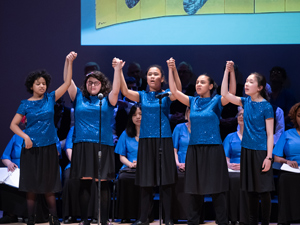 | 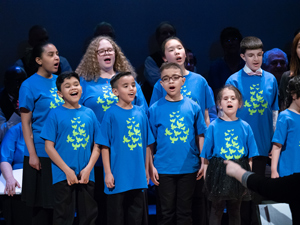 |
| Another school ensemble,
The Guava Tones, in performance.
| Members of the CMPYP (Comprehensive Music
Program for Young People) Youth Chorus
raise their voices in song. |
She emphasized that although FMDG provides a direct service to New York area residents, its reach is much broader as a result of its teacher training workshops which attract college students from all parts of the country who want to learn how to work with children and adults who have vision loss. “We’ve also done some Skyping with international students,” she added.
Another positive development is that the school is becoming known as a go-to resource for band directors from colleges, universities and public school districts who have students with vision loss. “We want to get to the point where a band director who has a trumpet player who’s blind and needs a braille part can just push a button and get it,” she said, adding that FMDG is developing a new revenue stream by producing large print and braille music. She explained that this is part of a plan for the school to leverage its expertise in accessible music technology, which includes computer assisted learning tools and instruments.
“You always have to have the core music school, the lab school, where college students learning how to accommodate and work with children and adults who have vision loss,” said Jones. “But then the greater community is expanding because of technology and because people need to have inclusion today. This is where we’ve become more vital than ever.”
Even so, the school could use a financial boost as it positions itself for its next phase of growth and searches for a permanent home. It accepts donations at www.fmdgmusicschool.org/donate.
How a Music School Was Born and Named Courtesy of NYU Law School
Courtesy of NYU Law School
“The Holt sisters quickly learned that more was needed than access to the arts. They launched a groundbreaking campaign to train blind people and to prevent blindness-causing diseases. Eventually the program expanded and developed into a formal music school. This community music program has served generations of visually impaired students.”
Years later, the school was renamed after Filomen M. D'Agostino Greenberg, a self-taught stock trader turned philanthropist who was also an important benefactor of the New York University School of Law. She died in 2000 at age 101, according to her New York Times obituary.
Policy:
The FMDG Music School does not and shall not discriminate on the basis of race, color, religion, gender, gender expression, age, national origin, disability, or sexual orientation in any of its activities or operations. We are committed to providing an inclusive and welcoming environment for all members of our staff, students, volunteers, vendors, and clients.